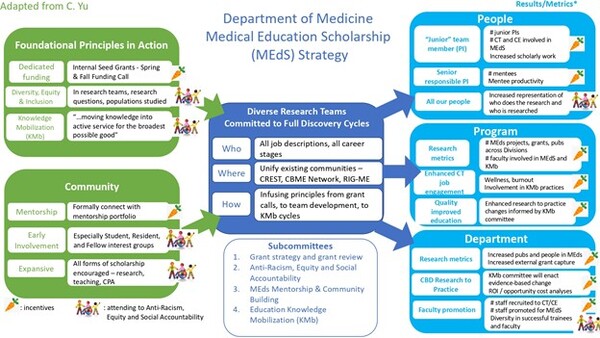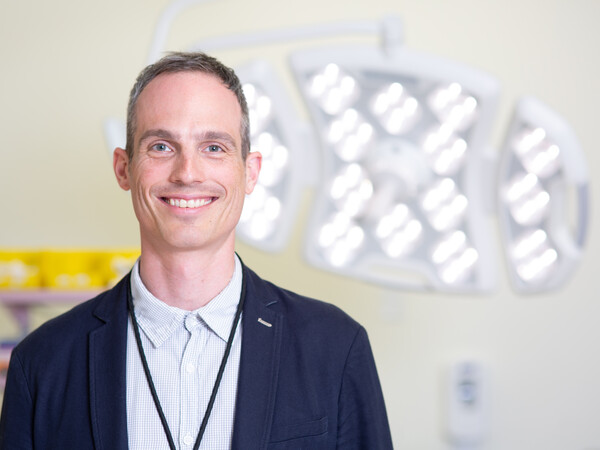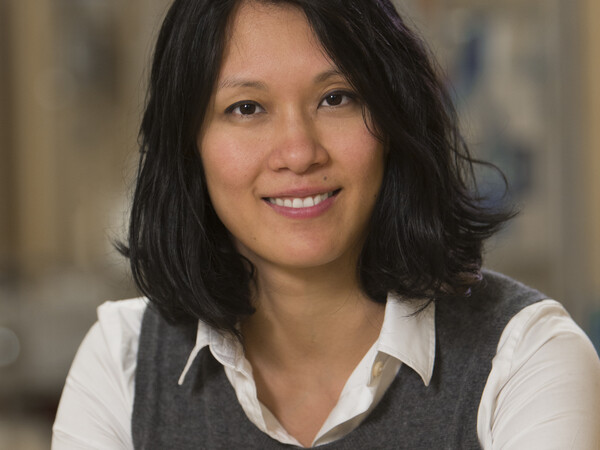Medical Education Scholarship (MEdS)
The purpose of Medical Education Scholarship (MEdS) in the Department of Medicine is to:
- Accelerate academic impacts of education scholarship and the discovery of new knowledge;
- Support the careers of trainees, clinician teachers, clinician educators, and investigators/scientists in education; and
- Adapt and mobilize our research knowledge to respond to the education challenges of our day.
The Department of Medicine defines medical education scholarship as development, implementation, evaluation, and/or investigation of education activities, programs, and products, which is informed by both practice-based and research-based knowledge. The goal of the MEdS portfolio is to actively and consistently encourage knowledge mobilization that connects education scholars with frontline educators.

True to the tenets of educational scholarship, the MEdS team considers its strategic plan to be an ongoing partnership with its community and will be open to iterative refinements throughout the next five years. Such reciprocity will help achieve the MEdS vision of leading in medical education scholarship through a commitment to diversity, partnerships and meaningful impacts for people, patients, and society.
MEdS priorities include dedicated seed grant funding, EDI principles and practices, knowledge mobilization activities, and community-building that promotes various mentorship experiences for faculty and trainees. By creating diverse research teams committed to full discovery and knowledge mobilization cycles, the MEdS portfolio will:
- Increase the scholarly productivity of clinician teachers and clinician educators involved in MEdS with the goal of improving: (a) research metrics like publications, and a greater number of external grants awarded to DoM faculty, and (b) their wellness and engagement in systems change through meaningful collaborations.
- Enhance representation of who does the research, our research questions, and the populations we study, with a focus on anti-racism, equity and social accountability.
- Enhance ‘research to practice’ changes that are informed by a Knowledge Mobilization Committee, especially within the realm of CBME implementation across divisions.
Quick Links
What funding and resources exist to support my MEdS work?
The Department of Medicine offers two funding opportunities annually (Spring and Fall) for medical education scholarship and research. The funds will be available to full and part-time faculty, as well as trainees in Divisions appointed to the Department of Medicine, University of Toronto.
This grants program aims to support MEdS projects with a defined and timely objective. The program also aims to fund pilot projects, which will produce data needed for applications to external funding agencies. See Bi-Annual Strategic MEdS Grant Competition below for more information. Click here to read the MEdS Grant Competition Guidelines [PDF]
What is the plan for MEdS?
Building on input received at the 2020 retreat, and from members of the DoM Education Executive Committee, the MEdS team have developed a robust five-year plan to achieve its mission of embedding high-impact knowledge discovery, innovation, and knowledge mobilization within the DoM and beyond. True to the tenets of educational scholarship, the MEdS team considers the plan to be an ongoing partnership with its community and will be open to iterative refinements throughout the next five years. Such reciprocity will help achieve the MEdS vision of leading in medical education scholarship through a commitment to diversity, partnerships and meaningful impacts for people, patients, and society.
Foundational priorities within their plan include dedicated seed grant funding, EDI principles and practices, knowledge mobilization activities, and community-building that promotes various mentorship experiences for our faculty and trainees. By creating diverse research teams committed to full discovery and knowledge mobilization cycles, the MEdS strategy will:
- Increase the scholarly productivity of clinician teachers and clinician educators involved in MEdS with the goal of improving: (a) research metrics like publications, and a greater number of external grants awarded to DoM faculty, and (b) their wellness and engagement in systems change through meaningful collaborations.
- Enhance representation of who does the research, MEdS research questions, and the populations MEdS scholars study, with a focus on anti-racism, equity and social accountability.
- Enhance ‘research to practice’ changes that are informed by a Knowledge Mobilization Committee, especially within the realm of CBME implementation across divisions.
Current MEdS Initiatives
- Working Group on Redefining Teaching Effectiveness in the DoM
- CBME Research Network, led by Dr. Shiphra Ginsburg
- Innovation in scholarship and education in EDI
- CBD Portfolio, led by Dr. Heather McDonald-Blumer
- Mentorship
Who can I talk to about my MEdS work?
- Dr. Ryan Brydges: If you have an idea for a scholarly project and have questions to inform the design, analysis, interpretation, and implementation of your work, please email Ryan for a MEdS Project Consultation.
- Dr. Christie Lee: If you have a question about how to document your MEdS work toward a successful career in this field, please email Christie for a MEdS Career Consultation
- Judy Tran: For all inquiries, please include Judy our Portfolio Coordinator at judy.tran@utoronto.ca
Bi-Annual Strategic MEdS Grant Competition
Current Strategic MEdS Grant Competition
Deadline: April 8, 2024
This grants program has been designed to support Medical Education Scholarship (MEdS) projects with a defined and timely objective. The program also aims to fund pilot projects, which will produce data needed for applications to external funding agencies. The funding available for any individual project will range from $5,000 to $10,000, depending on the period of funding required. Of note, we do prefer funding many smaller grants, rather than single larger applications. Up to $20,000 will be awarded for each competition.
The MEdS team will be accepting short proposals (maximum three pages) with a deadline of April 8, 2024.
In keeping with the strategic plan of the Department of Medicine, priority will be given to projects that promote research and scholarship in: Culture & Inclusion (and related portfolios, like Equity); adapting and refining competency-based education, and valuing clinician teaching & innovation.
Project proposals that extend beyond these priority areas will also be considered.
Winners of the Bi-Annual Strategic MEdS Grant Competition
Congratulations to the winners of the Strategic Medical Education Scholarship (MEdS) Grant Competition:
Spring 2023
Stakes as perceived by residents in seeking formative assessments using the framework of entrustable professional activities in competency based medical education
Principal Investigator: Gousia Dhhar
Co-Investigators: Dr. Walter Tavares, Dr. Pim Teunissen
Fall 2022
Setting the PACE for learning: Supporting medical students' motivation during web-based instruction through purpose and interest prompts
Principal Investigators: Adam Gavarkovs (PI), Ryan Brydges (Co-PI), Jeffrey J. H. Cheung (Co-PI)
Co-Investigators: Rashmi A. Kusurkar, Marcus Law, Ananya Gangopadhyaya
Developing Learning Objectives from Core Competencies for Medical Students in Canada
Principal Investigators: Dena Sommer (resident PGY5) and Thirumagal Yogaparan
Spring 2022
Evaluating the Impacts of an Integrated Geriatrics Clerkship Curriculum on Attitudes, Interest and Competency in Caring for Older Adults Amongst New Graduates of Temerty School of Medicine
Principal Investigator: Dr. Jillian Alston
Co-Investigator: Dr. Michelle Hart
M.E.D.I.C. (Mentoring-Evaluation Driving Improvement of the Canadian) Black Physicians Mentoring Program
Principal Investigator: Dr. Mireille Norris
Co-Investigator: Dr. Modupe Tunde-Byass
A study to assess the feasibility and acceptability of video-based training in bystander CPR and AED use in schools across Canada
Principal Investigators: Dr. Natalie Wong and Dr. Katherine Allan
Co-Investigator: Dr. Jordan Ezekian
Winter 2021:
General Medicine Inpatient Initiative Medical Education Database (GEMINI MedED): A Multicentre Study of Internal Medicine Resident Case Mix, Clinical Care, and Patient Outcomes
Principal Investigator(s): Shiphra Ginsburg, Andrew CL Lam
Co-Investigator(s): Brandon Tang, Brian M Wong, Fahad Razak, Amol Verma, Daniel Schumacher, Ben Kinnear
Designing, Implementing, and Evaluating a New Communication Curriculum for Goals of Care Discussions in Critical Care
Principal Investigators: Dr. Dominique Piquette & Dr. Maria Jogova
Co-Investigators: Dr. Anne Kawamura, Dr. Christie Lee, Dr. Warren Lewin, Dr. Nancy McNaughton, Dr. Betty Onyura
Funding Opportunities: Temerty Faculty of Medicine
The Continuing Professional Development David Fear Fellowship is a $2,000 fellowship award to a Temerty Faculty of Medicine faculty member to attend an educational leadership course in continuing education and professional development, visit another CPD department, or complete an innovative educational program or grant.
The Comprehensive Research Experience for Medical Students (CREMS) offers funding to support a summer or in-term medical student and allows interested medical students to gain extracurricular research experiences in various structured programs without interrupting their medical studies. For those faculty members requiring matching funds, the DFCM runs an internal competition. Maximum $5500 (requires matched funding).
Instructional Technology Innovation Fund (ITIF) is a seed fund designed to catalyze initiatives that immediately and directly impact University of Toronto education and teaching programs through innovation and development. The ITIF is focused specifically on the practical applications of technology in design, implementation, evaluation, curriculum renewal, faculty development, or continuing education initiatives that enrich learning. There are two funding streams: 1. Traditional Stream: awards of up to $15,000, matching funds required (the DFCM runs an internal competition for these matching funds, please contact the Office of Education Scholarship for details), and 2. Small Scale Seed Funding Stream: awards of up to $2,000, no matching funds required.
Medical Humanities Education Matching Funding Grant The integration of humanities in medical education curricula has the potential to improve observation skills, self-reflection, and enhance learner competencies in the CanMEDS roles. Projects and proposals may reflect a variety of curricular designs which identify how medical humanities will be integrated into curricula and further enhance CanMEDS competencies. This grant offers $5,000 per project proposal, distributed on a semi-annual basis. Each proposal will require a matching funding commitment from the submitting department/division.
Adapted from the Department of Family and Community Medicine Office of Education Scholarship
Funding Opportunities: External
AERA American Educational Research Association Awards grants for conferences intended to break new ground in substantive areas of inquiry, stimulate new lines of study on issues that have been largely unexplored, or develop innovative research methods or techniques that can contribute more generally to education research. Maximum $35,000.
AERA American Educational Research Association, Education Research Service Projects (ERSP) Program encourages education researchers to offer their pro bono expertise to educational organizations, institutions, or other community groups that have identified and expressed a need for such assistance. $1,000-$5,000.
International Association for Medical Education (AMEE) AMEE Research Grant Award The receipt of a grant award will recognise the work of an individual or group both locally and internationally. £10,000
AMS Phoenix Project: A Call to Caring is focused on making a positive and lasting difference in how health professionals develop and sustain their abilities to provide humane, compassionate, person-centred care. The project offers both a Fellowship and grant opportunities. $50,000 (requires matched funding).
CAME Wooster Family Grant in Medical Education is meant to support new and innovative projects in medical education that are not part of a larger, formalized and funded education research program. Applicants must be CAME members. Up to $10,000 per project.
Canadian Association of Emergency Physicians (CAEP) Physicians, fellows, and residents working in diverse academic, non-academic, community, and rural settings are encouraged to submit Research Grant Proposals. Projects may have an educational focus. $5000-$10.000
Canadian Foundation for Innovation (CFR) - Various Opportunities
CIHR Canadian Institutes of Health Research (CIHR) Foundation Grant Program - Programs of research are expected to include integrated, thematically-linked research, knowledge translation and mentoring/training components.
MCC Medical Council of Canada (MCC) W. Dale Dauphinee Fellowship - To support medical educators to enhance their knowledge and skills in physician assessment. $37,500.
Medical Council of Canada - Research in Clinical Assessment Grant to support innovations in the assessment of clinical competence or performance of students, postgraduate trainees or practitioners. $37,500.
Ministry of Health and Long-Term Care Health System Research Fund
The HSRF Program Awards provide strategic three-year investments ($0.5-$0.8M /year) to programs of health research and/or knowledge translation and exchange (KTE) that focus on identified government priorities. $7.5M over 3 years)
Ministry of Research & Innovation Early Researcher Award Program gives funding to new researchers working at publicly funded Ontario research institutions to build a research team. $100,000 (requires matching funds)
National Board of Medical Examiners Edward J. Stemmler Medical Education Research Fund support for research on, and development of, innovative assessment approaches that will enhance the professional development of those preparing to, or continuing to, practice medicine. $150,000 for 2 years.
National Sciences and Engineering Research Council of Canada (NSERC)/Collaborative Health Research Projects (CHRP). Average is $121,160-$138,850 for up to 3 years.
Phil R. Manning Research Award in Continuing Medical Education from The Society for Academic Continuing Medical Education (SACME) is intended to support original research related to physician lifelong learning within the domain of assessment and/or competency-based CME/CPD. Maximum $50,000 over 2 years.
PSI Foundation education fellowship for practicing physicians - To encourage practising physicians to undertake training to acquire a clinical skill or knowledge currently lacking in the community or to undertake training in research methodology.
PSI Physicians’ Services Incorporated Foundation. Up to $100,000/yr, maximum of 2 years. Health Research Grants:
- Clinical research
- Medical education research at the post M.D. level
- Health systems research
- Healthcare research by community physicians
PSI Physicians’ Services Incorporated Foundation. Up to $250,000 for a maximum of 3 years. New Investigator Research Grant:
- Clinical research
- Medical education research at the post M.D. level
- Health systems research
- Healthcare research by community physicians
RCPSC Royal College of Physicians and Surgeons of Canada Regional Professional Development Grant. Maximum $4,000.
Royal College/Associated Medical Services CanMEDS Research Development Grant To support research, development, and/or implementation of projects that advance compassion and caring as realized through the intrinsic CanMEDS roles, in order to realize the mission of social accountability in the training and continuing professional development of specialists. Maximum $25,000.
RCPSC Royal College of Physicians and Surgeons of Canada Medical Education Research Grant Supports quality research in Canada that will advance the field of postgraduate medical education or continuing professional development. $5,000 - $50,000.
RCPSC Royal College of Physicians and Surgeons of Canada Robert Maudsley Fellowship for Studies in Medical Education one-year fellowship for training in the science of medical education. $40,000 per years of study, up to 2 years.
SDRME Society of Directors of Research in Medical Education Research Review Synthesis Papers Proposals SDRME is interested in supporting the writing of review/synthesis papers that make a substantial contribution to advancing practice, theory, or research in medical education. Maximum $4,000.
Social Sciences and Humanities Research Council Insight Development Grants support research in its initial stages. The grants enable the development of new research questions, as well as experimentation with new methods, theoretical approaches and/or ideas. $7,000-$75,000.
Spencer Foundation Small Research Grants committed to supporting high-quality investigation of education through its research programs. Maximum $50,000.
Spencer Foundation Conference Grants for Advancing Education Research to bring together researchers whose substantive knowledge, theoretical insight, and methodological expertise can be assembled in ways that build upon and advance best practices in education research. Maximum $50,000.
Spencer Foundation Lyle Spencer Research Awards To support large-scale education research projects, $100,000 - $1,000,000.
Tri-council funding Information on CIHR, NSERC and SSHRC funding can be found on the University of Toronto Research and Innovation website.
Adapted from the Department of Family and Community Medicine Office of Education Scholarship
Meet the MEdS Team

Dr. Ryan Brydges
Director
Ryan supports scholarly and research projects through varying levels of supervision and mentorship. He leads portfolio strategy and administration and will re-establish the Competency-Based Medical Education (CBME) Research Network and an education knowledge mobilization strategy across the DoM. Email Ryan

Dr. Christie Lee
Assistant Director
Christie is the lead in further building and strengthening our community of MEdS scholars and developing internal and external relationships. She also leads in mentoring Clinician Teachers and Educators through their promotion pathways for their MEdS work. Email Christie

Judy Tran
MEdS Coordinator
With an MBA in strategic management, Judy coordinates all administrative and strategic activities within the MEdS portfolio. Email Judy
